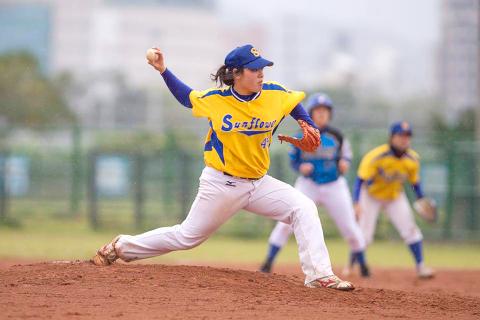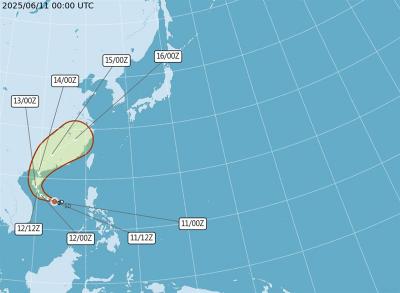Baseball might be Taiwan’s national pastime, but as in most nations where the game is played, it has remained almost exclusively a game for men.
Taiwan’s first women’s baseball team was not founded until 2001, almost a century after the creation of its first men’s team during Japanese colonial rule in 1903.
Today, 17 years later, three pioneers are hoping to make baseball an even more viable option for female athletes in Taiwan after being signed to play in the world’s only professional baseball league for women — the Japan Women’s Baseball League (JWBL).

Photo courtesy of Taiwan Women’s Baseball Advocate Association
They are pitcher/infielder Hsieh Yu-ying (謝鈺瀅) and outfielder Shen Chia-wen (沈嘉文), who are to play for the Kyoto Flora, and pitcher/outfielder Tseng Chi (曾琪), who joined the Aichi Dione.
“It might be somewhat of an exaggeration, but I think they are like [Taiwanese baseball star] Chen Chin-feng (陳金鋒),” baseball commentator Tseng Wen-chen (曾文誠) said.
Much like Chen, who became the first Taiwanese to play in the US major leagues with the Los Angeles Dodgers in 2002 and opened the doors for others like him, these women in their early 20s are “trailblazers,” creating a new path that others can follow, Tseng said.
Having these role models to look up to is a morale boost to everybody who walks the lonely road of women’s baseball in Taiwan, said Shawan Liao (廖立欣), secretary-general of the Taiwan Women’s Baseball Advocate Association (TWBAA).
“Even more importantly, it shows that you can actually make a living if you play well enough,” she added.
Growing up a baseball lover like many Taiwanese, Liao said she has always loved playing the sport, but found fewer women playing the game with her the older she grew.
“There is a deeply rooted misconception in Taiwan that baseball is for men and softball is for women,” Liao said.
What makes things worse is that Taiwan’s women’s softball team is very competitive internationally, she said, adding that as a result, most women who love baseball in their youth grow up to play softball instead, and they can now earn a living doing it after the formation of a semi-professional softball league in May 2016.
However, that does not mean they have forgotten their love of baseball, said Liao, who makes a living working in a breakfast restaurant.
Taiwan’s first amateur women’s baseball team, named Kapok after the silk-cotton tree, was formed in Kaohsiung in August 2001, followed by the Taipei Vanguard later the same month and the Taichung Sunflower in January 2002.
Many of the players were former softball players who still had a passion for baseball, while others, like Liao, had little training, but wanted to play for the love of the game.
They played for fun at riverside parks on weekends and sought out games with other teams from around the globe over the Internet.
The result was the first-ever series of games between teams from Taiwan and Hong Kong in August 2002 — an important milestone for female Taiwanese baseball players, Liao said.
Although it might be surprising that the former British colony would have women’s baseball teams, Liao said the relative obscurity of the sport in Hong Kong has actually made it easier to promote baseball for women there.
“No one has any idea what baseball is in Hong Kong, so no one in Hong Kong has any bias against women playing baseball, unlike in Taiwan,” she said.
Another milestone came in 2004, when the first all-women’s baseball tournament was held in Taiwan.
Organized by the Chinese Taipei Baseball Association (CTBA), the tourney was aimed at identifying players to form a national squad for the first Women’s Baseball World Cup later that year.
The national team ultimately finished last in the five-team tournament, but just participating was a triumph in itself, Liao said.
Since then, the CTBA has held a women’s baseball competition annually and Taiwan’s world ranking has improved. It finished fourth among 12 teams in the most recent Women’s Baseball World Cup in 2016.
However, despite relatively good international results, women’s baseball has struggled to develop a following, prompting the creation of the TWBAA in 2013 to raise the profile of the sport, hold games, and give training to players and coaches.
The association also holds international competitions with other nations and territories, including Japan, South Korea, Hong Kong, the US, Australia and Guam.
With three Taiwanese heading to Japan to play professionally, the female baseball playing community in Taiwan is bound to be inspired and grow, Liao said.
The three players are well aware they have a mission that is far bigger than themselves.
“We will do our best to try to make the starting lineup soon,” Hsieh said at the Feb. 4 news conference in Taipei that was held to announce that they would play in Japan. “By joining the league, we ... hope to encourage others to follow.”
The three were recruited not only because of their skill, but because of their desire to help other female players in Taiwan, JWPL representative Aya Sugiura said.
“In the tryout interviews, all three of them said they wanted to play pro baseball in Japan because they hoped to later become coaches so that they could return to Taiwan to promote women’s baseball,” Sugiura said.
The four-team JWBL was founded in 2009 to provide career opportunities for female baseball lovers around the world, she said, adding: “Ultimately we see great potential for women’s baseball development in Japan, as well as in Taiwan.”

A magnitude 6.4 earthquake struck off the coast of Hualien County in eastern Taiwan at 7pm yesterday, the Central Weather Administration (CWA) said. The epicenter of the temblor was at sea, about 69.9km south of Hualien County Hall, at a depth of 30.9km, it said. There were no immediate reports of damage resulting from the quake. The earthquake’s intensity, which gauges the actual effect of a temblor, was highest in Taitung County’s Changbin Township (長濱), where it measured 5 on Taiwan’s seven-tier intensity scale. The quake also measured an intensity of 4 in Hualien, Nantou, Chiayi, Yunlin, Changhua and Miaoli counties, as well as

Taiwan is to have nine extended holidays next year, led by a nine-day Lunar New Year break, the Cabinet announced yesterday. The nine-day Lunar New Year holiday next year matches the length of this year’s holiday, which featured six extended holidays. The increase in extended holidays is due to the Act on the Implementation of Commemorative and Festival Holidays (紀念日及節日實施條例), which was passed early last month with support from the opposition Chinese Nationalist Party (KMT) and Taiwan People’s Party. Under the new act, the day before Lunar New Year’s Eve is also a national holiday, and Labor Day would no longer be limited

COMMITMENTS: The company had a relatively low renewable ratio at 56 percent and did not have any goal to achieve 100 percent renewable energy, the report said Pegatron Corp ranked the lowest among five major final assembly suppliers in progressing toward Apple Inc’s commitment to be 100 percent carbon neutral by 2030, a Greenpeace East Asia report said yesterday. While Apple has set the goal of using 100 percent renewable energy across its entire business, supply chain and product lifecycle by 2030, carbon emissions from electronics manufacturing are rising globally due to increased energy consumption, it said. Given that carbon emissions from its supply chain accounted for more than half of its total emissions last year, Greenpeace East Asia evaluated the green transition performance of Apple’s five largest final

The first tropical storm of the year in the western North Pacific, Wutip (蝴蝶), has formed over the South China Sea and is expected to move toward Hainan Island off southern China, the Central Weather Administration (CWA) said today. The agency said a tropical depression over waters near the Paracel and Zhongsha islands strengthened into a tropical storm this morning. The storm had maximum sustained winds near its center of 64.8kph, with peak gusts reaching 90kph, it said. Winds at Beaufort scale level 7 — ranging from 50kph to 61.5kph — extended up to 80km from the center, it added. Forecaster Kuan Hsin-ping